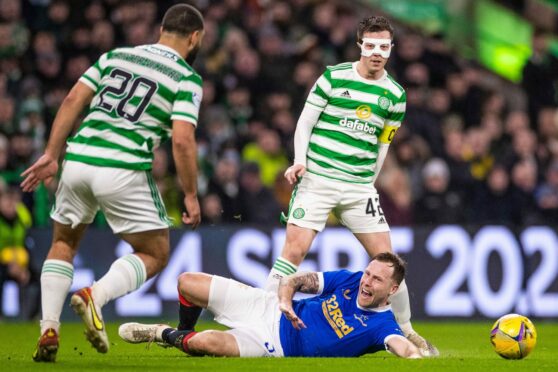
A crusading MP has criticised Scotland’s biggest football clubs for ignoring harm inflicted by gambling on young people, accusing them of “taking the sponsorship money and running”.
Ronnie Cowan MP, vice-chair of Westminster’s all-party group on gambling-related harm, criticised Scottish Premiership clubs Celtic, Rangers and Dundee United for failing to consider the potential harm of gambling among children before signing deals with betting firms.
He said fans were now increasingly worried about their teams being associated with gambling. Online betting site Dafabet is the current Celtic shirt sponsor while Rangers have the logo of the 32Red online casino firm on their shirts.
Last month, Dundee United signed up online gambling platform QuinnCasino as their shirt sponsor for the 2022-23 season.
Inverclyde MP Cowan said: “Fans acknowledge the draw of the money but many feel their shirt is tarnished by the logos. While the UK Government dither, the harm being done by gambling is increasing year in year out.
“I’ve asked Celtic, Rangers and Dundee United if they have done a risk assessment on carrying gambling adverts on your football shirts. None of them have. They just take the money and run.
“When I was kid growing up, I worshipped George Best. He could do no wrong in my eyes. I wore my football shirt outside my shorts, I wore my hair a bit long like him. If he had ‘Bet XYZ’ on that iconic red Manchester United strip that may have softened my view on gambling growing up.”
None of the three clubs responded to our request for a comment.
The news came as more than 20,000 people signed an online petition calling for Everton to drop their new gambling sponsor. The Merseyside club announced a deal with online casino stake.com in recent weeks. The firm’s logo will appear on the men’s and women’s team shirts next season but the move triggered fury among fans with campaigners calling the move “saddening”.
Ministers have launched a review into Britain’s gambling laws. Figures showed major firms made almost £2 billion in operating profits last year.
It is feared that much-awaited restrictions on gambling may be diluted. Recent reports suggest UK Government proposals to ban football clubs from allowing betting companies to display their logos on strips will not be included in a review of gambling legislation.
Celtic sponsor Dafabet’s African gamble as world’s poorest are urged to bet
An overdue White Paper on the issue will reportedly advocate dropping a ban on shirt advertising in favour of English Premier League clubs making a voluntary agreement.
Last season, nine out of 20 clubs – including major teams such as Newcastle United – had a betting firm’s logo on the front of their shirts.
Campaigners have called for a ban due to fears fans, including children, are being bombarded with gambling advertising. Logos are not included on children’s replica kits but they do feature on adults’ shirts and on the strips teams wear while playing.
Cowan said: “The feeling is that now in the English Premier League, they will say you need to stop this by a certain date but they will allow lower-league clubs to continue to do it.
“That is hugely unfair. If you are taking a child to a game, it doesn’t matter if it is the Premier League or the first or second division, those guys are your heroes. So you are protecting the rich kids who have parents that are season ticket holders at Arsenal or Spurs or whatever. But you are not protecting the kids that are going to watch lower-league football. If you are prepared to ban it, you are doing that because you know it does harm. So why would you stop after one league? The biggest percentage of damage is done in deprived areas such as the one I represent.”
Cowan previously said change was needed including a move to a situation where gambling was “tolerated, not promoted”.
He added: “The behaviour of the gambling firms has really helped fuel my anger about this. I am not anti-gambling. It is the damage that is done by it.
“There is a reason why bookmakers cluster together in high streets in deprived areas. There is a reason you don’t find them in more affluent areas of town. People have been fleeced to support an industry where people at the top end pay themselves disgusting amounts of money.”
The Betting and Gaming Council said: “The regulated betting and gaming industry provides some of the country’s most popular sport with vital funding, including the English Football League, which receives £40m.
“The government has previously stated research did not establish a causal link between exposure to advertising and the development of problem gambling.
“Betting advertising and sponsorship must comply with strict guidelines and safer gambling messaging is regularly and prominently displayed.
“It should also be noted that betting operators’ logos cannot be used on children’s clothing – including replica football kits – while the whistle to whistle ban has reduced the number of TV betting commercials viewed by children during live sports before the watershed by 97%.
“We are encouraged by the latest figures from the Gambling Commission that showed the rate of problem gambling was 0.2% of the population – down from 0.4% the year previous.”
There are 650 gambling-related suicides in the UK each year and more than a million people with a gambling disorder.
Last year, a House of Lords report stated Britain’s gambling habit cost the public purse up to £1.2bn a year in areas such as crime, joblessness and treating addiction.

Enjoy the convenience of having The Sunday Post delivered as a digital ePaper straight to your smartphone, tablet or computer.
Subscribe for only £5.49 a month and enjoy all the benefits of the printed paper as a digital replica.
Subscribe